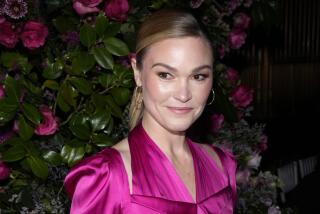Making ‘Sense’ for the small screen
Let us address the inevitable question head on: Why go to the trouble to remake “Sense and Sensibility,” even for “Masterpiece Theatre’s” current and noble resolution to air “The Complete Jane Austen,” when Ang Lee’s version, starring Emma Thompson and Kate Winslet, is so beloved and widely available?
Well, those theater people -- actors, directors, screenwriters, etc. -- always think they can do it better, or more provocatively, or set in the future or something. And if they’re going to remake “Animal House,” why not “Sense and Sensibility”?
A better answer is that television can do things movies can’t. Thompson’s screenplay may have won her the Oscar in 1996, but to feed the demands of the big screen, liberties were taken. Oh yes, they were taken, and not all of them explicable. Why was the duel between Colonel Brandon and Mister Willoughby cut? Or Willoughby’s late-night confession to Elinor? What happened to Sir John’s wife?
Rejoice, Austen purists, here they are, miraculously restored in a two-part production that is just as lush and star-studded as the film version. If Andrew Davies’ script is a tad more steamy, it is also less glossy, painting a more nuanced portrait of genteel poverty, and the trials four women on their own would face. This “Sense and Sensibility” is truer not only to Austen’s narrative, it more successfully captures the quiet precision of her singular mind -- she was the master of finding poetry in domestic detail, and for that, the small screen is much better suited than the large.
Certainly the cast is above reproach. As Elinor Dashwood, Hattie Morahan is the very model of good sense and gentle propriety, managing the family’s reduced circumstances with loving firmness. Her fresh-faced sister, Marianne (Charity Wakefield), provides its requisite ringlets and tempestuous heart. As their mother, Janet McTeer, who apparently can do anything (she was last seen in “Five Days” and “The Amazing Mrs. Pritchard”), is such a fully realized character that you can’t help but hope for a Mrs. Dashwood spin-off.
We meet them all just after they have been done out of their inheritance by the period’s sexist laws and the greed of their half-brother John (Mark Gatiss) and his deliciously social-climbing wife, Fanny (Claire Skinner). Fanny wants the Dashwood girls out of “her” manor home faster than Nancy Reagan wanted the Carters out of the White House. Actually, even faster -- her brother Edward Ferrars (a dreamy Dan Stevens) shows up for a visit and very obviously “forms an attachment” with Elinor, which simply will not do.
So off the Dashwoods go to a cottage by the sea, grim and ramshackle though the views are excellent, as they include David Morrissey as the stalwart Col. Brandon, who immediately falls for Marianne. Alas for her, she prefers the racier attentions of young Mr. Willoughby (Dominic Cooper), with his long-lashed intimations of impropriety.
There isn’t a missed note among them -- though Morrissey’s Brandon is so sexy it’s hard to explain Marianne not returning his affections. Even smaller roles are full to the brim with alarmingly talented actors: Mark Williams (Mr. Weasley from the “Harry Potter” series) plays Mrs. Dashwood’s cousin Sir John Middleton, Linda Bassett (“Calendar Girls”) his frank and earthy mother-in-law, Mrs. Jennings -- and if that isn’t enough, Jean Marsh (Rose! From “Upstairs, Downstairs”!) makes a grand appearance as Fanny’s mother, the haughty and hateful Mrs. Ferrars.
More important, Austen’s glorious mundane is marvelously present: the distracted exhaustion of Sir John’s young, and apparently quite fertile, wife; the dim and warren-like rooms of the cottage; Marianne’s fractious, and adolescent, initial reaction to the idea of marrying Col. Brandon.
In this modern day of frankness, therapy and full disclosure first-dates, the idea that Marianne’s behavior is incautious and inappropriate -- she goes riding alone with Willoughby, gives him a lock of her hair and writes to him all without the protection of an engagement -- seems more a lesson of women’s history month than a real narrative device. But that, of course, is not what “Sense and Sensibility” is about. Austen’s real concerns -- when and to whom you should give your heart, how a person’s temperament can be both a catalyst and obstacle to happiness and, of course, the necessity of true love, and some money, to marriage -- are as fresh and fascinating now as they were 200 years ago.
Which is why so many of us are still crazy about Jane and why there is always room for another “Sense and Sensibility.” Especially this one.
--
--
‘Sense and Sensibility’
Where: KCET
When: Part 1, 9 to 10:30 p.m., Sunday; Part 2, 9 to 10:30 p.m., April 6
Rating: TV-PG (may be unsuitable for young children)
More to Read
Only good movies
Get the Indie Focus newsletter, Mark Olsen's weekly guide to the world of cinema.
You may occasionally receive promotional content from the Los Angeles Times.







